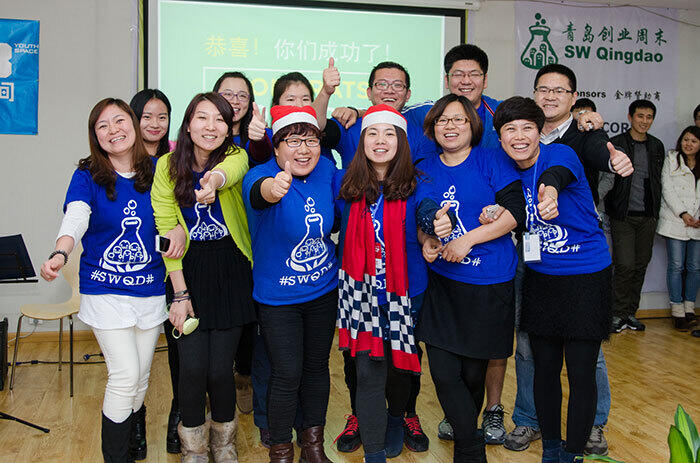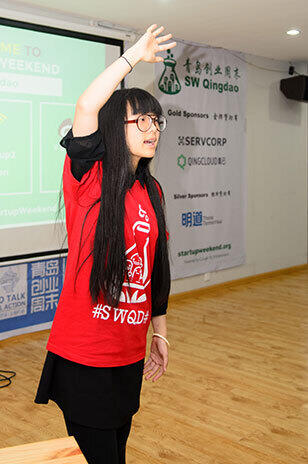
As “Community Development Manager” for UP Global in China, I’ve been doing many things to help grow and promote our communities, events, and programs around China. Initially I’ve been focused on our most mature and established program, Startup Weekend.
For those that don’t know, Startup Weekends “are 54-hour events where developers, designers, marketers, product managers and startup enthusiasts come together to share ideas, form teams build products and launch startups!” We hold roughly 1000 events per year around the world.
Since December 2014, community growth in China has been looking very strong. We’ve held successful Startup Weekend events in two new cities, Qingdao and Xi’an as well as events in more established cities like Shanghai and Hong Kong.
We’ve planted a lot of seeds. May and April of 2015 will include a busy schedule of events, including upcoming events in Beijing, Hangzhou and Shanghai among several others. Number-wise, these will likely lead us to reach the same number of events we held in all of 2014 by May of 2015.
In view of the strong push towards new events in new cities and some special edition or themed events, I wanted to share some of the data and key insights of what I’ve learned about promoting Startup Weekends in China.
First off, let’s take a look at a bit of the data.
Report: Traffic and Conversions for Recent Startup Weekend Events in China (November 2014 - January 2015):
Since moving all mainland China events to a centralized ticketing platform, we’ve been able to better understand our traffic and conversions. While we still had a few “out of system” events at the end of 2014 that did provide data like Shanghai, we do have a pretty detailed picture of traffic and conversion rates.

Here are some of the initial takeaways from this data.
Tips for Successfully Getting Registrations to Startup Weekends in China

2-3% Registration Conversions
Most of the events have had a conversation of 2-3%. We’ve been pretty happy with this conversation rate and think this is a good metric for organizers to know. At the same time, we’ve learned some lessons about improving this rate, which we’ve noted below.
Need to Drive 2500 to 4500 page views
The goal for Startup Weekends in China is to reach around 60-80 attendees per event. This is a good number for event quality, diversity of talents and backgrounds and ultimately a good mix for creating effective startup teams. Smaller events are acceptable, but 80 is ideal from our experience.
It is also a solid impact for any startup community to have a density of 60-80 entrepreneurs working together for an entire weekend.
In order to reach that number, we recommend driving at least 2500 page views to the ticketing site. With a conversion rate of 2-3% you can find at least 60-80 participants.
Let’s look at how we drive this traffic.
Biggest Driver of Traffic in China: WeChat is God
We’ve come to see WeChat as the most significant source of traffic in China. For our events, WeChat has been the largest contributor to traffic and, in turn, for conversions and registrations.
In practice, that generally means you need to spread out multiple posts and media shares (like promo graphics and videos) for several weeks leading up to the event.
We encourage and see a lot of benefit from postings via multiple channels and media partners. A dedicated WeChat channel for a Startup Weekend community can be beneficial in the long-term, but initially it is helpful to have community partners that will post a general or tweaked version of the basic event info via their subscription channel.

Moment and Group Shares in WeChat
Ultimately the key factor behind effectively using Wechat are people sharing and reposting your posts, pictures and graphics on their “Moments.” For WeChat, moments are a very effective way to create a gorilla campaign of people sharing your event info.
Equally important can be posting to groups. Many WeChat users are members of very targeted groups where an event share can lead to a very high conversion.
Don’t neglect asking or nagging people to share the event via their moments or in targeted groups. It makes a big difference.
It’s not a complicated formula: More shares equals more traffic equals more participants.
Build an Event Group Before the Event in WeChat
One interesting technique for getting better engagement, handling questions and leading to even more participants is to create an event WeChat group. It is best limited to only participants, organizers and mentors and judges.
As people register, collect their WeChat ID and then invite them to the event WeChat group. There they can ask questions and even start to meet and engage before the event.
This channel can also help create a sense of community and meaning and even get your more attendees as people get excited about Startup Weekend.
Alternative Promotional Channels in China.
While WeChat is the social media giant in China, there are also several other channels that deserve a minimum of effort and time in order to provide alternative information sharing. The sources outside of WeChat that we’ve found as beneficial are QQ Zone, Weibo and even LinkedIn as well as, to a lesser extent, Douban and Meetup.com groups as well as regional and technical forums.
In the case of Weibo and QQ Zone, you need to find a well established brand or person to share your event. Personal sharing is not as important. The goal is to have a strong and trusted broadcaster to reach the maximum amount of people. For example, the US Consulate has a huge and engaged following in China, and their sharing on QQ Zone and Weibo led to registrations in Shanghai and Chengdu.
In the case of LinkedIn, almost all major Chinese cities have business, startup and event groups. You should share your event info, a brief description and link in these groups. Then, in order to promote into group members’ feed and email notifications, you should have some of your co-organizers or volunteers LIKE the post. This increases the likelihood of it being seen.

Don’t Promote without Key People like Mentors and Judges First
One important lesson we’ve learned in Xi’an (and to a lesser extent Shanghai) is that you shouldn’t promote and drive traffic without first having a few mentors or judges confirmed and visible.
You need good mentors and judges on your event and ticketing page BEFORE you drive traffic. Otherwise people just won’t engage. So the key to have at least a few people there as mentors, organizers and judge BEFORE you should launch your registration campaign.
Promotion Schedule and Reaching Your Goals
Like Startup Weekend around the world, it’s never too early to start planning and promoting your event. In general though the main promotion should coincide with the opening of registration, which we find is best started 1 month before the event.
In order to get traffic you need to share and post via WeChat. We’ve found that 1-2 posts per week for 4-5 weeks before the event leads to the best results. Aim to create 1-2 general promo posts and a few general informational posts about startups and startup advice. All should link to your registration page. Videos and promo posters are also quite effective too.
Like any product or promotion, you need to create multiple batches of users. These waves of users provide a secondary force for getting more attendees.
Ideally, you should aim to reach the following metrics:
- 3 weeks before the event: at least 20-25 paid attendees
- 2 weeks before the event: at least 30 paid attendees
- 1 week before the event: at least 40-50 paid attendees
Ultimately you will see an increase in traffic and registrations during the last week before the event. In some events, we’ve seen 40-50% of attendees register in the last week.
This doesn’t mean wait until the last week. It means building up to the last week will help secure the final group of attendees to reach your ideal number.

Challenges of Third and Fourth Tier Cities
We’ve found that reaching the goal of 60-80 participants can be tough for first time organizers and cities. This is especially true in Third and Fourth Tier Cities.
This is largely due to the fact that new cities don’t know what startups are, let alone startup weekend. Cities like Xi’an and Qingdao ended up promoting the event to a lot of people but not necessarily the best people.
This is an added challenge, but with the increasing importance of innovation and startups, it’s not impossible to find a passionate group of attendees in any city in China. What both these events and others did manage to do was reach a solid initial group of registrations, which in turn created attendees converting more attendees. Don’t neglect the importance of even a few initial registrations.
Conclusion: Find Partners, Create a More Entrepreneurial World
In conclusion, hopefully this data, suggestions and schedule for promotion will help current and future organizers in China better understand how to promote their event.
Like most things, the key is to have great people involved on all levels but especially as organizers, partners and sponsors. These people add a credibility and trust to your event and organization. Through WeChat and other networks, they largely drive people to you, which following some of the advice above you can convert into participants.
In the end, the goal is not just registrations and sales conversions; the goal is to create more entreprenuers and startup teams and ultimately a more entrepreneurial world.
Interested? Questions? Contact me
If you wish to learn more about our China Initiative, please check out our Chinese site at china.startupweekend.org. No VPN? Try startupweekend.gitcafe.com.
If you have any direct questions or are interested in attending or organizing, contact me directly at mark.koester@startupweekend.org or on WeChat at markwkoester.
(Thanks to Startup Weekend Qingdao for their wonderful pictures!)
